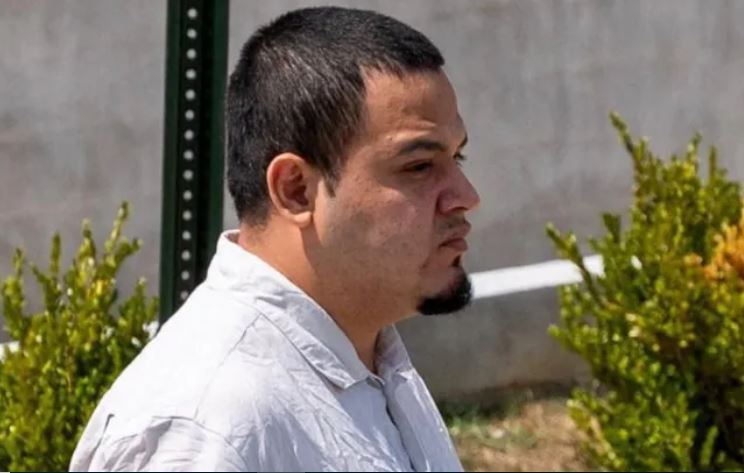
 Salvadoran national Kilmar Ábrego García./SCREENGRAB
Salvadoran national Kilmar Ábrego García./SCREENGRAB
Less than 24 hours after his release, US authorities have informed Kilmar Ábrego García that he may be deported to Uganda, following his refusal to accept a plea deal in a pending criminal case, his lawyers say.
Attorneys for Mr Ábrego García say he declined an offer to plead guilty to human smuggling charges in exchange for deportation to Costa Rica—a deal proposed after it became clear he would be released from custody.
His lawyers now accuse the US government of trying to "coerce" him to plead guilty by threatening to re-deport him "halfway across the world" to Uganda.
The Salvadoran national was mistakenly deported to El Salvador in March, and then brought back to face criminal charges.
Who is Kilmar Ábrego García?
Kilmar Ábrego García, a 30-year-old from El Salvador, has lived much of his life caught between survival and controversy.
According to court documents, he fled his home country at just 16 after gangs targeted and extorted his family. He eventually joined his brother, a U.S. citizen, in Maryland, though he had no legal status to remain.
In the U.S., Ábrego worked in construction and started a family with Jennifer Vasquez Sura. By 2018, the couple were living together with her two children, and they welcomed their first child together soon after.
Ábrego’s troubles with law enforcement began in March 2019 when he was detained outside a Home Depot while seeking day labor.
Police had received a tip from an informant alleging he was part of the MS-13 gang. However, he was never charged with a crime and was instead handed over to U.S. Immigration and Customs Enforcement (ICE).
Ábrego has consistently denied any ties to MS-13 and has no criminal record in either El Salvador or the United States, his attorneys have emphasized.
An immigration judge later ruled against his asylum request on procedural grounds but granted him protection from deportation, citing the very real threat of gang violence he would face back home.
Under federal supervision, Ábrego was allowed to work legally and continued to report regularly to immigration authorities.
Why has his case drawn international attention?
Ábrego’s situation escalated in 2020 when the Trump administration labeled MS-13 a foreign terrorist group. Despite a judge’s order protecting him from deportation, he was forcibly sent to El Salvador, where he claims he was beaten and subjected to psychological abuse in prison.
President Nayib Bukele dismissed those claims, but the U.S. later admitted it had wrongly placed him in a maximum-security facility.
The case reached the U.S. Supreme Court, which directed the government to arrange Ábrego’s return. He was brought back to the United States in June that year. However, his legal troubles did not end there.
Authorities later charged him with migrant trafficking after a 2022 traffic stop in Tennessee, where he was found driving nine passengers. Though officers let him continue at the time, federal prosecutors later pursued charges.
Ábrego pleaded not guilty, with his lawyers arguing that the case amounts to selective and vindictive prosecution.
By then, he had already spent more than 160 days separated from his wife and children, who continue to publicly defend him.
The deal to be sent to Costa Rica was offered on Thursday after it became clear Mr Ábrego García would likely be freed from a Tennessee jail on Friday.
The Costa Rican government agreed to accept him as a refugee and provide him legal status there, a letter from a Costa Rican official included in the legal filing says.
Mr Abrego Garcia would only be deported to Costa Rica after serving his sentence on the smuggling charges, according to the court filing.
His attorneys now say that upon Mr Ábrego García's release from federal custody, they were informed of the government's intention to deport him to Uganda - a country with which he has no known ties.
"The DOJ, DHS, and ICE are using their collective powers to force Mr. Abrego to choose between a guilty plea followed by relative safety, or rendition to Uganda, where his safety and liberty would be under threat," the lawyers wrote in the filing.
The lawyers say Mr Ábrego García has until Monday morning to accept a plea in exchange for deportation to Costa Rica, "or else that offer will be off the table forever".
It was not immediately clear whether he was considering the government offer.
Now in Maryland with his family, Mr Ábrego García is scheduled to appear in a Baltimore immigration court on Monday. If a judge approves the government's request, he could face deportation within days.
The US reached bilateral deportation agreements with Honduras and Uganda as part of its crackdown on illegal immigration, according to documents obtained by the BBC's US partner CBS.
"This is a temporary arrangement with conditions including that individuals with criminal records and unaccompanied minors will not be accepted," Bagiire Vincent Waiswa, permanent secretary to the Ugandan foreign ministry, said in a statement.
"Uganda also prefers that individuals from African countries shall be the ones transferred to Uganda."
Mr Ábrego García's deportation case has become a fixture of the Trump administration's crackdown on immigration.
He was deported to his native El Salvador in March, and initially kept in the notorious Cecot prison. But after US government officials acknowledged he was deported due to an "administrative error", a judge ordered the administration to "facilitate" his return.
He was returned to the United States in early June and sent to the state of Tennessee, where he was charged in a human smuggling scheme. He has pleaded not guilty to the charges.
In late June, a federal judge in Tennessee had ruled that Mr Ábrego García was eligible for release, but remained in jail over fears from his own legal team that he could be swiftly deported again if he left the facility.












